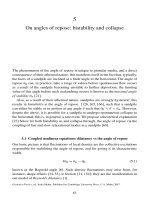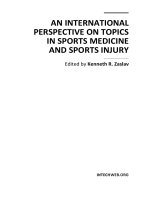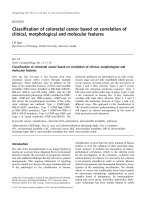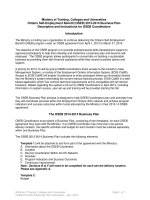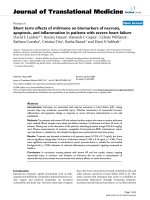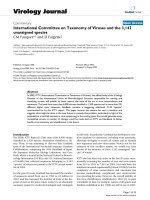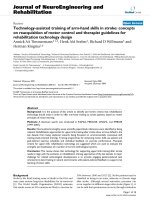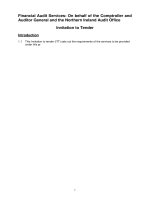INTERNATIONAL CONVENTION ON STANDARDS OF TRAINING, CERTIFICATION AND WATCHKEEPING FOR SEAFARERS 1978
Bạn đang xem bản rút gọn của tài liệu. Xem và tải ngay bản đầy đủ của tài liệu tại đây (226.77 KB, 73 trang )
International Convention on Standards of Training, Certification
and Watchkeeping for Seafarers, 1978
(London, 7 July 1978)
THE PARTIES TO THIS CONVENTION,
DESIRING to promote safety of life and property at sea and the protection
of the marine environment by establishing in common agreement
international standards of training, certification and watchkeeping for
seafarers,
CONSIDERING that this end may best be achieved by the conclusion of an
International Convention on Standards of Training, Certification and
Watchkeeping for Seafarers,
HAVE AGREED as follows:
Article I
General obligations under the Convention
(1) The Parties undertake to give effect to the provisions of the Convention
and the Annex thereto, which shall constitute an integral part of the
Convention. Every reference to the Convention constitutes at the same time
a reference to the Annex.
(2) The Parties undertake to promulgate all laws, decrees, orders and
regulations and to take all other steps which may be necessary to give the
Convention full and complete effect, so as to ensure that, from the point of
view of safety of life and property at sea and the protection of the marine
environment, seafarers on board ships are qualified and fit for their duties.
Article II
Definitions
For the purpose of the Convention, unless expressly provided otherwise:
(a) "Party" means a State for which the Convention has entered into force;
(b) "Administration" means the Government of the Party whose flag the ship
is entitled to fly;
(c) "Certificate" means a valid document, by whatever name it may be
known, issued by or under the authority of the Administration or recognized
by the Administration authorizing the holder to serve as stated in this
document or as authorized by national regulations;
(d) "Certificated" means properly holding a certificate;
(e) "Organization" means the Inter-Governmental Maritime Consultative
Organization (IMCO);
(f) "Secretary-General" means the Secretary-General of the Organization;
(g) "Sea-going ship" means a ship other than those which navigate
exclusively in inland waters or in waters within, or closely adjacent to,
sheltered waters or areas where port regulations apply;
(h) "Fishing vessel" means a vessel used for catching fish, whales, seals,
walrus or other living resources of the sea;
(i) "Radio Regulations" means the Radio Regulations annexed to, or regarded
as being annexed to, the most recent International Telecommunication
Convention which may be in force at any time.
Article III
Application
The Convention shall apply to seafarers serving on board sea-going ships
entitled to fly the flag of a Party except to those serving on board:
(a) warships, naval auxiliaries or other ships owned or operated by a State
and engaged only on governmental non-commercial service; however, each
Party shall ensure by the adoption of appropriate measures not impairing
the operations or operational capabilities of such ships owned or operated
by it, that the persons serving on board such ships meet the requirements of
the Convention so far as is reasonable and practicable;
(b) fishing vessels;
(c) pleasure yachts not engaged in trade; or
(d) wooden ships of primitive build.
Article IV
Communication of information
(1) The Parties shall communicate as soon as practicable to the SecretaryGeneral:
(a) the text of laws, decrees, orders, regulations and instruments
promulgated on the various matters within the scope of the Convention;
(b) full details, where appropriate, of contents and duration of study
courses, together with their national examination and other requirements
for each certificate issued in compliance with the Convention;
(c) a sufficient number of specimen certificates issued in compliance with
the Convention.
(2) The Secretary-General shall notify all Parties of the receipt of any
communication under paragraph (1)(a) and, inter alia, for the purposes of
Articles IX and X, shall, on request, provide them with any information
communicated to him under paragraphs (1)(b) and (c).
Article V
Other treaties and interpretation
(1) All prior treaties, conventions and arrangements relating to standards of
training, certification and watchkeeping for seafarers in force between the
Parties, shall continue to have full and complete effect during the terms
thereof as regards:
(a) seafarers to whom this Convention does not apply;
(b) seafarers to whom this Convention applies, in respect of matters for
which it has not expressly provided.
(2) To the extent, however, that such treaties, conventions or arrangements
conflict with the provisions of the Convention, the Parties shall review their
commitments under such treaties, conventions and arrangements with a
view to ensuring that there is no conflict between these commitments and
their obligations under the Convention.
(3) All matters which are not expressly provided for in the Convention
remain subject to the legislation of Parties.
(4) Nothing in the Convention shall prejudice the codification and
development of the law of the sea by the United Nations Conference on the
Law of the Sea convened pursuant to resolution 2750C(XXV) of the General
Assembly of the United Nations, nor the present or future claims and legal
views of any State concerning the law of the sea and the nature and extent
of coastal and flag State jurisdiction.
Article VI
Certificates
(1) Certificates for masters, officers or ratings shall be issued to those
candidates who, to the satisfaction of the Administration, meet the
requirements for service, age, medical fitness, training, qualification and
examinations in accordance with the appropriate provisions of the Annex to
the Convention.
(2) Certificates for masters and officers, issued in compliance with this
Article, shall be endorsed by the issuing Administration in the form as
prescribed in Regulation I/2 of the Annex. If the language used is not
English, the endorsement shall include a translation into that language.
Article VII
Transitional provisions
(1) A certificate of competency or of service in a capacity for which the
Convention requires a certificate and which before entry into force of the
Convention for a Party is issued in accordance with the laws of that Party or
the Radio Regulations, shall be recognized as valid for service after entry
into force of the Convention for that Party.
(2) After the entry into force of the Convention for a Party, its
Administration may continue to issue certificates of competency in
accordance with its previous practices for a period not exceeding five years.
Such certificates shall be recognized as valid for the purpose of the
Convention. During this transitional period such certificates shall be issued
only to seafarers who had commenced their sea service before entry into
force of the Convention for that Party within the specific ship department
to which those certificates relate. The Administration shall ensure that all
other candidates for certification shall be examined and certificated in
accordance with the Convention.
(3) A Party may, within two years after entry into force of the Convention
for that Party, issue a certificate of service to seafarers who hold neither an
appropriate certificate under the Convention nor a certificate of
competency issued under its laws before entry into force of the Convention
for that Party but who have:
(a) served in the capacity for which they seek a certificate of service for not
less than three years at sea within the last seven years preceding entry into
force of the Convention for that Party;
(b) produced evidence that they have performed that service satisfactorily;
(c) satisfied the Administration as to medical fitness, including eyesight and
hearing, taking into account their age at the time of application.
For the purpose of the Convention, a certificate of service issued under this
paragraph shall be regarded as the equivalent of a certificate issued under
the Convention.
Article VIII
Dispensation
(1) In circumstances of exceptional necessity, Administrations, if in their
opinion this does not cause danger to persons, property or the environment,
may issue a dispensation permitting a specified seafarer to serve in a
specified ship for a specified period not exceeding six months in a capacity,
other than that of the radio officer or radiotelephone operator, except as
provided by the relevant Radio Regulations, for which he does not hold the
appropriate certificate, provided that the person to whom the dispensation
is issued shall be adequately qualified to fill the vacant post in a safe
manner, to the satisfaction of the Administration. However, dispensations
shall not be granted to a master or chief engineer officer, except in
circumstances of force majeure
and then only for the shortest possible period.
(2) Any dispensation granted for a post shall be granted only to a person
properly certificated to fill the post immediately below. Where certification
of the post below is not required by the Convention, a dispensation may be
issued to a person whose qualification and experience are, in the opinion of
the Administration, of a clear equivalence to the requirements for the post
to be filled, provided that, if such a person holds no appropriate certificate,
he shall be required to pass a test accepted by the Administration as
demonstrating that such a dispensation may safely be issued. In addition,
Administrations shall ensure that the post in question is filled by the holder
of an appropriate certificate as soon as possible.
(3) Parties shall, as soon as possible after 1 January of each year, send a
report to the Secretary-General giving information of the total number of
dispensations in respect of each capacity for which a certificate is required
that have been issued during the year to sea-going ships, together with
information as to the numbers of those ships above and below 1,600 gross
register tons respectively.
Article IX
Equivalents
(1) The Convention shall not prevent an Administration from retaining or
adopting other educational and training arrangements, including those
involving sea-going service and shipboard organization especially adapted to
technical developments and to special types of ships and trades, provided
that the level of sea-going service, knowledge and efficiency as regards
navigational and technical handling of ship and cargo ensures a degree of
safety at sea and has a preventive effect as regards pollution at least
equivalent to the requirements of the Convention.
(2) Details of such arrangements shall be reported as early as practicable to
the Secretary-General who shall circulate such particulars to all Parties.
Article X
Control
(1) Ships, except those excluded by Article III, are subject, while in the
ports of a Party, to control by officers duly authorized by that Party to
verify that all seafarers serving on board who are required to be certificated
by the Convention are so certificated or hold an appropriate dispensation.
Such certificates shall be accepted unless there are clear grounds for
believing that a certificate has been fraudulently obtained or that the
holder of a certificate is not the person to whom that certificate was
originally issued.
(2) In the event that any deficiencies are found under paragraph (1) or
under the procedures specified in Regulation I/4 - "Control Procedures", the
officer carrying out the control shall forthwith inform, in writing, the
master of the ship and the Consul or, in his absence, the nearest diplomatic
representative or the maritime authority of the State whose flag the ship is
entitled to fly, so that appropriate action may be taken. Such notification
shall specify the details of the deficiencies found and the grounds on which
the Party determines that these deficiencies pose a danger to persons,
property or the environment.
(3) In exercising the control under paragraph (1) if, taking into account the
size and type of the ship and the length and nature of the voyage, the
deficiencies referred to in paragraph (3) of Regulation I/4 are not corrected
and it is determined that this fact poses a danger to persons, property or
the environment, the Party carrying out the control shall take steps to
ensure that the ship will not sail unless and until these requirements are
met to the extent that the danger has been removed. The facts concerning
the action taken shall be reported promptly to the Secretary-General.
(4) When exercising control under this Article, all possible efforts shall be
made to avoid a ship being unduly detained or delayed. If a ship is so
detained or delayed it shall be entitled to compensation for any loss or
damage resulting therefrom.
(5) This Article shall be applied as may be necessary to ensure that no more
favourable treatment is given to ships entitled to fly the flag of a non-Party
than is given to ships entitled to fly the flag of a Party.
Article XI
Promotion of technical co-operation
(1) Parties to the Convention shall promote, in consultation with, and with
the assistance of, the Organization, support for those Parties which request
technical assistance for:
(a) training of administrative and technical personnel;
(b) establishment of institutions for the training of seafarers;
(c) supply of equipment and facilities for training institutions;
(d) development of adequate training programmes, including practical
training on sea-going ships; and
(e) facilitation of other measures and arrangements to enhance the
qualifications of seafarers;
preferably on a national, sub-regional or regional basis, to further the aims
and purposes of the Convention, taking into account the special needs of
developing countries in this regard.
(2) On its part, the Organization shall pursue the aforesaid efforts, as
appropriate, in consultation or association with other international
organizations, particularly the International Labour Organisation.
Article XII
Amendments
(1) The Convention may be amended by either of the following procedures:
(a) amendments after consideration within the Organization:
(i) any amendment proposed by a Party shall be submitted to the SecretaryGeneral, who shall then circulate it to all Members of the Organization, all
Parties and the Director-General of the International Labour Office at least
six months prior to its consideration;
(ii) any amendment so proposed and circulated shall be referred to the
Maritime Safety Committee of the Organization for consideration;
(iii) Parties, whether or not Members of the Organization, shall be entitled
to participate in the proceedings of the Maritime Safety Committee for
consideration and adoption of amendments;
(iv) amendments shall be adopted by a two-thirds majority of the Parties
present and voting in the Maritime Safety Committee expanded as provided
for in sub-paragraph (a)(iii) (hereinafter referred to as the "expanded
Maritime Safety Committee") on condition that at least one third of the
Parties shall be present at the time of voting;
(v) amendments so adopted shall be communicated by the SecretaryGeneral to all Parties for acceptance;
(vi) an amendment to an Article shall be deemed to have been accepted on
the date on which it is accepted by two thirds of the Parties;
(vii) an amendment to the Annex shall be deemed to have been accepted:
1. at the end of two years from the date on which it is communicated to
Parties for acceptance; or
2. at the end of a different period, which shall not be less than one year, if
so determined at the time of its adoption by a two-thirds majority of the
Parties present and voting in the expanded Maritime Safety Committee;
however, the amendments shall be deemed not to have been accepted if
within the specified period either more than one third of Parties, or Parties
the combined merchant fleets of which constitute not less than fifty per
cent of the gross tonnage of the world's merchant shipping of ships of 100
gross register tons or more, notify the Secretary-General that they object to
the amendment;
(viii) an amendment to an Article shall enter into force with respect to
those Parties which have accepted it, six months after the date on which it
is deemed to have been accepted, and with respect to each Party which
accepts it after that date, six months after the date of that Party's
acceptance;
(ix) an amendment to the Annex shall enter into force with respect to all
Parties, except those which have objected to the amendment under subparagraph (a)(vii) and which have not withdrawn such objections, six
months after the date on which it is deemed to have been accepted. Before
the date determined for entry into force, any Party may give notice to the
Secretary-General that it exempts itself from giving effect to that
amendment for a period not longer than one year from the date of its entry
into force, or for such longer period as may be determined by a two-thirds
majority of the Parties present and voting in the expanded Maritime Safety
Committee at the time of the adoption of the amendment; or
(b) amendment by a conference:
(i) upon the request of a Party concurred in by at least one third of the
Parties, the Organization shall convene, in association or consultation with
the Director-General of the International Labour Office, a conference of
Parties to consider amendments to the Convention;
(ii) every amendment adopted by such a conference by a two-thirds
majority of the Parties present and voting shall be communicated by the
Secretary-General to all Parties for acceptance;
(iii) unless the conference decides otherwise, the amendment shall be
deemed to have been accepted and shall enter into force in accordance
with the procedures specified in sub-paragraph (a)(vi) and (a)(viii) or subparagraphs (a)(vii) and (a)(ix) respectively, provided that references in
these sub-paragraphs to the expanded Maritime Safety Committee shall be
taken to mean references to the conference.
(2) Any declaration of acceptance of, or objection to, an amendment or any
notice given under paragraph (1)(a)(ix) shall be submitted in writing to the
Secretary-General, who shall inform all Parties of any such submission and
the date of its receipt.
(3) The Secretary-General shall inform all Parties of any amendments which
enter into force, together with the date on which each such amendment
enters into force.
Article XIII
Signature, ratification, acceptance, approval and accession
(1) The Convention shall remain open for signature at the Headquarters of
the Organization from 1 December 1978 until 30 November 1979 and shall
thereafter remain open for accession. Any State may become a Party by:
(a) signature without reservation as to ratification, acceptance or approval;
or
(b) signature subject to ratification, acceptance or approval, followed by
ratification, acceptance or approval; or
(c) accession.
(2) Ratification, acceptance, approval or accession shall be effected by the
deposit of an instrument to that effect with the Secretary-General.
(3) The Secretary-General shall inform all States that have signed the
Convention or acceded to it and the Director-General of the International
Labour Office of any signature or of the deposit of any instrument of
ratification, acceptance, approval or accession and the date of its deposit.
Article XIV
Entry into force
(1) The Convention shall enter into force twelve months after the date on
which not less than twenty-five States, the combined merchant fleets of
which constitute not less than fifty per cent of the gross tonnage of the
world's merchant shipping of ships of 100 gross register tons or more, have
either signed it without reservation as to ratification, acceptance or
approval or deposited the requisite instruments of ratification, acceptance,
approval or accession in accordance with Article XIII.
(2) The Secretary-General shall inform all States that have signed the
Convention or acceded to it of the date on which it enters into force.
(3) Any instrument of ratification, acceptance, approval or accession
deposited during the twelve months referred to in paragraph (1) shall take
effect on the coming into force of the Convention or three months after the
deposit of such instrument, whichever is the later date.
(4) Any instrument of ratification, acceptance, approval or accession
deposited after the date on which the Convention enters into force shall
take effect three months after the date of deposit.
(5) After the date on which an amendment is deemed to have been
accepted under Article XII, any instrument of ratification, acceptance,
approval or accession deposited shall apply to the Convention as amended.
Article XV
Denunciation
(1) The Convention may be denounced by any Party at any time after five
years from the date on which the Convention entered into force for that
Party.
(2) Denunciation shall be effected by notification in writing to the
Secretary-General who shall inform all other Parties and the DirectorGeneral of the International Labour Office of any such notification received
and of the date of its receipt as well as the date on which such denunciation
takes effect.
(3) A denunciation shall take effect twelve months after receipt of the
notification of denunciation by the Secretary-General or after any longer
period which may be indicated in the notification.
Article XVI
Deposit and registration
(1) The Convention shall be deposited with the Secretary-General who shall
transmit certified true copies thereof to all States that have signed the
Convention or acceded to it.
(2) As soon as the Convention enters into force, the Secretary-General shall
transmit the text to the Secretary-General of the United Nations for
registration and publication, in accordance with Article 102 of the Charter
of the United Nations.
Article XVII
Languages
The Convention is established in a single copy in the Chinese, English,
French, Russian and Spanish languages, each text being equally authentic.
Official translations in the Arabic and German languages shall be prepared
and deposited with the signed original.
IN WITNESS WHEREOF the undersigned, being duly authorized by their
respective Governments for that purpose, have signed the Convention.
DONE AT LONDON this seventh day of July, one thousand nine hundred and
seventy-eight.
ANNEX
CHAPTER I
GENERAL PROVISIONS
Regulation I/1
Definitions
For the purpose of this Convention, unless expressly provided otherwise:
(a) "Regulations" means Regulations contained in the Annex to the
Convention;
(b) "Approved" means approved by the Administration;
(c) "Master" means the person having command of a ship;
(d) "Officer" means a member of the crew, other than the master,
designated as such by national law or regulations or in the absence of such
designation by collective agreement or custom;
(e) "Deck officer" means a qualified officer in the deck department;
(f) "Chief mate" means the deck officer next in rank to the master and upon
whom the command of the ship will fall in event of the incapacity of the
master;
(g) "Engineer officer" means a qualified officer in the engine department;
(h) "Chief engineer officer" means the senior engineer officer, responsible
for the mechanical propulsion of the ship;
(i) "Second engineer officer" means the engineer officer next in rank to the
chief engineer officer and upon whom the responsibility for the mechanical
propulsion of the ship will fall in the event of the incapacity of the chief
engineer officer;
(j) "Assistant engineer officer" means a person under training to become an
engineer officer and designated as such by national law or regulations;
(k) "Radio officer" means a person holding a first class or second class
radiotelegraph operator's certificate or a radiocommunication operator's
general certificate for the maritime mobile service issued under the
provisions of the Radio Regulations, who is employed in the radiotelegraph
station of a ship which is required to have such a station by the
International Convention for the Safety of Life at Sea;
(l) "Radiotelephone operator" means a person holding an appropriate
certificate issued under the provisions of the Radio Regulations;
(m) "Rating" means a member of the ship's crew other than the master or an
officer;
(n) "Near-coastal voyages" means voyages in the vicinity of a Party as
defined by that Party;
(o) "Propulsion power" means the power in kilowatts which appears on the
ship's Certificate of Registry or other official document;[1]
(p) "Radio duties" include, as appropriate, watchkeeping and technical
maintenance and repairs in accordance with the Radio Regulations, the
International Convention for the Safety of Life at Sea and, at the discretion
of each Administration, the relevant IMCO recommendations;
(q) "Oil tanker" means a ship constructed and used for the carriage of
petroleum and petroleum products in bulk;
(r) "Chemical tanker" means a ship constructed and used for the carriage in
bulk of any liquid chemical listed in the IMCO "Code for the Construction and
Equipment of Ships carrying Dangerous Chemicals in Bulk";
(s) "Liquefied gas tanker" means a ship constructed and used for the carriage
in bulk of any liquefied gas listed in the IMCO "Code for the Construction and
Equipment of Ships carrying Liquefied Gases in Bulk".
Regulation I/2
Content of certificates and form of endorsement
1. Certificates shall be in the official language or languages of the issuing
country. If the language used is not English, the text shall include a
translation into that language.
2. In respect of radio officers and radiotelephone operators, Administrations
may:
(a) include the additional knowledge required by the relevant Regulations of
the Annex to the Convention in the examination for the issue of a
certificate complying with the Radio Regulations; or
(b) issue a separate certificate indicating that the holder has the additional
knowledge required by the Annex to the Convention.
3. The form of certificate endorsement required by Article VI of the
Convention shall be as follows:
Form of Endorsement of Certificates
ENDORSEMENT OF CERTIFICATES
(Official Seal) (Country)
Issued under the provisions of the International, Convention on Standards of
Training, Certification and Watchkeeping for Seafarers, 1978
Either* The Government of (name) certifies
I, the undersigned certify
that the present Certificate/Certificate No:
......................................**, is issued
to ................................................ (full name of person), who has
been found duly qualified in accordance with the provisions of
Regulation ................... of the International Convention on Standards of
Training, Certification and Watchkeeping for Seafarers, 1978,
as ............................................*** with the following limitations
only:
Insert
here } ......................................................................................
........
limitations } ..............................................................................
................
or "none"
as } .........................................................................................
.....
appropriate } .............................................................................
............
Date of issue of this endorsement: ............................................
(Official seal) Signed ....................................................
(Name and signature of duly authorized official)
Date of birth of the holder of the Certificate: ..................................
Signature of the holder of the
Certificate: .....................................................
* Use one line or the other.
** Delete as appropriate.
*** Insert Convention grade or class of Certificate. [Footnotes appeared in
original text.]
Regulation I/3
Principles governing near-coastal voyages
1. Any Party defining near-coastal voyages for the purpose of the
Convention shall not impose training, experience or certification
requirements on the seafarers serving on board the ships entitled to fly the
flag of another Party and engaged on such voyages in a manner resulting in
more stringent requirements for such seafarers than for seafarers serving on
board ships entitled to fly its own flag. In no case shall any such Party
impose requirements in respect of seafarers serving on board ships entitled
to fly the flag of another Party in excess of those of the Convention in
respect of ships not engaged on near-coastal voyages.
2. With respect to ships entitled to fly the flag of a Party regularly engaged
on near-coastal voyages off the coast of another Party, the Party whose flag
the ship is entitled to fly shall prescribe training, experience and
certification requirements for seafarers serving on such ships at least equal
to those of the Party off whose coast the ship is engaged, provided that
they do not exceed the requirements of the Convention in respect of ships
not engaged on near-coastal voyages. A ship which extends its voyage
beyond what is defined as a near-coastal voyage by a Party and enters
waters not covered by that definition shall fulfil the requirements of the
Convention without relaxation under this Regulation.
3. A Party may afford a ship which is entitled to fly its flag the benefits of
the near-coastal voyages provisions of the Convention when it is regularly
engaged off the coast of a non-Party on near-coastal voyages as defined by
the Party.
4. Nothing in this Regulation shall in any way limit the jurisdiction of any
State, whether or not a Party to the Convention.
Regulation I/4
Control procedures
1. Control exercised by a duly authorized control officer under Article X
shall be limited to the following:
(a) verification in accordance with Article X(1) that all seafarers serving on
board who are required to be certificated by the Convention hold a valid
certificate or a valid dispensation;
(b) assessment of the ability of the seafarers of the ship to maintain
watchkeeping standards as required by the Convention if there are grounds
for believing that such standards are not being maintained because, while in
the port of a Party or in the approaches to that Port, the following have
occurred:
(i) the ship has been involved in a collision, grounding or stranding; or
(ii) there has been a discharge of substances from the ship when underway,
at anchor or at berth which is illegal under international conventions; or
(iii) the ship has been manoeuvred in an erratic or unsafe manner or
navigational course markers or traffic separation schemes have not been
followed.
2. The control officer shall provide written information to the master of the
ship and the appropriate representative of the flag State according to
Article X if, as a result of control action taken in accordance with paragraph
1, any of the following deficiencies are revealed:
(a) failure of seafarers, required to hold a certificate, to have an
appropriate valid certificate or valid dispensation;
(b) failure of navigational or engineering watch arrangements to conform to
the requirements specified for the ship by the flag State;
(c) absence in a watch of a person qualified to operate equipment essential
to safe navigation or the prevention of pollution;
(d) inability of the master to provide rested persons for the first watch at
the commencement of a voyage and subsequent relieving watches.
3. Failures to correct the deficiencies referred to in paragraph 2(a) - to the
extent that they relate to the certificates of the master, chief engineer
officer and officers in charge of navigational and engineering watches and,
where relevant, the radio officer - and in paragraph 2(b), shall be the only
grounds under Article X on which a Party may detain a ship.
CHAPTER II
MASTER - DECK DEPARTMENT
Regulation II/1
Basic principles to be observed in keeping a navigational watch
1. Parties shall direct the attention of shipowners, ship operators, masters
and watchkeeping personnel to the following principles which shall be
observed to ensure that a safe navigational watch is maintained at all times.
2. The master of every ship is bound to ensure that watchkeeping
arrangements are adequate for maintaining a safe navigational watch.
Under the master's general direction, the officers of the watch are
responsible for navigating the ship safely during their periods of duty when
they will be particularly concerned with avoiding collision and stranding.
3. The basic principles, including but not limited to the following, shall be
taken into account on all ships.
4. Watch arrangements
(a) The composition of the watch shall at all times be adequate and
appropriate to the prevailing circumstances and conditions and shall take
into account the need for maintaining a proper look-out.
(b) When deciding the composition of the watch on the bridge which may
include appropriate deck ratings, the following factors, inter alia, shall be
taken into account:
(i) at no time shall the bridge be left unattended;
(ii) weather conditions, visibility and whether there is daylight or darkness;
(iii) proximity of navigational hazards which may make it necessary for the
officer in charge of the watch to carry out additional navigational duties;
(iv) use and operational condition of navigational aids such as radar or
electronic position-indicating devices and any other equipment affecting the
safe navigation of the ship;
(v) whether the ship is fitted with automatic steering;
(vi) any unusual demands on the navigational watch that may arise as a
result of special operational circumstances.
5. Fitness for duty
The watch system shall be such that the efficiency of watchkeeping officers
and watchkeeping ratings is not impaired by fatigue. Duties shall be so
organized that the first watch at the commencement of a voyage and the
subsequent relieving watches are sufficiently rested and otherwise fit for
duty.
6. Navigation
(a) The intended voyage shall be planned in advance taking into
consideration all pertinent information and any course laid down shall be
checked before the voyage commences.
(b) During the watch the course steered, position and speed shall be
checked at sufficiently frequent intervals, using any available navigational
aids necessary, to ensure that the ship follows the planned course.
(c) The officer of the watch shall have full knowledge of the location and
operation of all safety and navigational equipment on board the ship and
shall be aware and take account of the operating limitations of such
equipment.
(d) The officer in charge of a navigational watch shall not be assigned or
undertake any duties which would interfere with the safe navigation of the
ship.
7. Navigational equipment
(a) The officer of the watch shall make the most effective use of all
navigational equipment at his disposal.
(b) When using radar, the officer of the watch shall bear in mind the
necessity to comply at all times with the provisions on the use of radar
contained in the applicable regulations for preventing collisions at sea.
(c) In cases of need the officer of the watch shall not hesitate to use the
helm, engines and sound signalling apparatus.
8. Navigational duties and responsibilities
(a) The officer in charge of the watch shall:
(i) keep his watch on the bridge which he shall in no circumstances leave
until properly relieved;
(ii) continue to be responsible for the safe navigation of the ship, despite
the presence of the master on the bridge, until the master informs him
specifically that he has assumed that responsibility and this is mutually
understood;
(iii) notify the master when in any doubt as to what action to take in the
interest of safety;
(iv) not hand over the watch to the relieving officer if he has reason to
believe that the latter is obviously not capable of carrying out his duties
effectively, in which case he shall notify the master accordingly.
(b) On taking over the watch the relieving officer shall satisfy himself as to
the ship's estimated or true position and confirm its intended track, course
and speed and shall note any dangers to navigation expected to be
encountered during his watch.
(c) A proper record shall be kept of the movements and activities during the
watch relating to the navigation of the ship.
9. Look-out
In addition to maintaining a proper look-out for the purpose of fully
appraising the situation and the risk of collision, stranding and other
dangers to navigation, the duties of the look-out shall include the detection
of ships or aircraft in distress, shipwrecked persons, wrecks and debris. In
maintaining a look-out the following shall be observed:
(a) the look-out must be able to give full attention to the keeping of a
proper look-out and no other duties shall be undertaken or assigned which
could interfere with that task;
(b) the duties of the look-out and helmsman are separate and the helmsman
shall not be considered to be the look-out while steering, except in small
ships where an unobstructed all-round view is provided at the steering
position and there is no impairment of night vision or other impediment to
the keeping of a proper look-out. The officer in charge of the watch may be
the sole look-out in daylight provided that on each such occasion:
(i) the situation has been carefully assessed and it has been established
without doubt that it is safe to do so;
(ii) full account has been taken of all relevant factors including, but not
limited to:
- state of weather
- visibility
- traffic density
- proximity of danger to navigation
- the attention necessary when navigating in or near traffic separation
schemes;
(iii) assistance is immediately available to be summoned to the bridge when
any change in the situation so requires.
10. Navigation with pilot embarked
Despite the duties and obligations of a pilot, his presence on board does not
relieve the master or officer in charge of the watch from their duties and
obligations for the safety of the ship. The master and the pilot shall
exchange information regarding navigation procedures, local conditions and
the ship's characteristics. The master and officer of the watch shall cooperate closely with the pilot and maintain an accurate check of the ship's
position and movement.
11. Protection of the marine environment
The master and officer in charge of the watch shall be aware of the serious
effects of operational or accidental pollution of the marine environment
and shall take all possible precautions to prevent such pollution, particularly
within the framework of relevant international and port regulations.
Regulation II/2
Mandatory minimum requirements for certification of masters and chief
mates of ships of 200 gross register tons or more
Master and chief mate of ships of 1,600 gross register tons or more
1. Every master and chief mate of a sea-going ship of 1,600 gross register
tons or more shall hold an appropriate certificate.
2. Every candidate for certification shall:
(a) satisfy the Administration as to medical fitness, particularly regarding
eyesight and hearing;
(b) meet the requirements for certification as an officer in charge of a
navigational watch on ships of 200 gross register tons or more and have
approved sea-going service in that capacity:
(i) for certification as chief mate, not less than 18 months; however, this
period may be reduced to not less than 12 months if the Administration
requires special training which it considers to be equivalent to at least six
months' service as officer in charge of a navigational watch;
(ii) for certification as master, not less than 36 months; however, this
period may be reduced to not less than 24 months if not less than 12 months
of such sea-going service has been served as chief mate, or if the
Administration requires special training which it considers to be equivalent
to such service;
(c) have passed appropriate examination to the satisfaction of the
Administration. Such examination shall include the material set out in the
Appendix to this Regulation, except that the Administration may vary these
examination requirements for masters and chief mates of ships of limited
size engaged on near-coastal voyages, as it considers necessary, bearing in
mind the effect on the safety of all ships which may be operating in the
same waters.
Master and chief mate of ships of between 200 and 1,600 gross register
tons
3. Every master and chief mate of a sea-going ship of between 200 and
1,600 gross register tons shall hold an appropriate certificate.
4. Every candidate for certification shall:
(a) satisfy the Administration as to medical fitness, particularly regarding
eyesight and hearing;
(b) (i) for certification as chief mate, meet the requirements of an officer in
charge of a navigational watch on ships of 200 gross register tons or more;
(ii) for certification as master, meet the requirements of an officer in
charge of a navigational watch on ships of 200 gross register tons or more
and have approved sea-going service in that capacity of not less than 36
months; however, this period may be reduced to not less than 24 months if
not less than 12 months of such sea-going service has been served as chief
mate, or if the Administration requires special training which it considers to
be equivalent to such service;
(c) have passed appropriate examination to the satisfaction of the
Administration. Such examination shall include the material set out in the
Appendix, except that the Administration may vary these examination
requirements for masters and chief mates of ships engaged on near-coastal
voyages, as it considers appropriate, to exclude such material as is not
applicable to the waters or ships concerned, bearing in mind the effect on
the safety of all ships which may be operating in the same waters.
General
5. The level of knowledge required under the different headings of the
Appendix may be varied according to whether the certificate is being issued
at master or chief mate level, and according to whether the certificate or
certificates is applicable to ships of 1,600 gross register tons or more, or to
ships of between 200 and 1,600 gross register tons.
APPENDIX TO REGULATION II/2
Minimum knowledge required for certification of masters and chief mates of
ships of 200 gross register tons or more
1. The syllabus given below is compiled for examination of candidates for
certification as master or chief mate of ships of 200 gross register tons or
more. It is intended to expand and extend in depth the subjects contained
in Regulation II/4 - "Mandatory Minimum Requirements for Certification of
Officers in Charge of a Navigational Watch on Ships of 200 Gross Register
Tons or More". Bearing in mind that a master has ultimate responsibility for
the safety of the ship, its passengers, crew and cargo, and that a chief mate
shall be in a position to assume that responsibility at any time, examination
in these subjects shall be designed to test their ability to assimilate all
available information that affects the safety of the ship.
2. Navigation and position determination
(a) Voyage planning and navigation for all conditions:
(i) by acceptable methods of plotting oceans tracks;
(ii) within restricted waters;
(iii) in ice;
(iv) in restricted visibility;
(v) in traffic separation schemes;
(vi) in areas of extensive tidal effects.
(b) Position determination:
(i) by celestial observations, including the use of sun, stars, moon and
planets;
(ii) by terrestrial observations, including the ability to use bearings from
landmarks and aids to navigation such as lighthouses, beacons and buoys in
conjunction with appropriate charts, notices to mariners and other
publications to assess the accuracy of the resulting position fix;
(iii) using all modern ship electronic navigational aids to the satisfaction of
the Administration, with specific knowledge of their operating principles,
limitations, sources of error, detection of misrepresentation of information
and methods of correction to obtain position fixing.
3. Watchkeeping
(a) Demonstrate thorough knowledge of content, application and intent of
the International Regulations for Preventing Collisions at Sea, including
those Annexes concerned with safe navigation.
(b) Demonstrate knowledge of Regulation II/1 - "Basic Principles to be
Observed in Keeping a Navigational Watch".
4. Radar equipment
Demonstrate in conjunction with the use of radar simulator or, when not
available, manoeuvring board, knowledge of the fundamentals of radar and
ability in the operation and use of radar, and in the interpretation and
analysis of information obtained from this equipment, including:
(a) Factors affecting performance and accuracy;
(b) setting up and maintaining displays;
(c) detection of misrepresentation of information, false echoes, sea return,
etc;
(d) range and bearing;
(e) identification of critical echoes;
